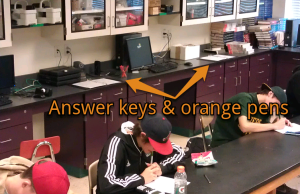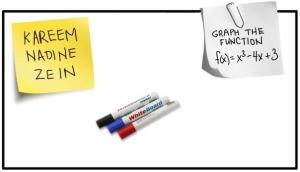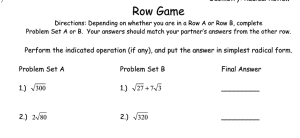Today marks my 6th Blogiversary. I started this thing documenting my daughter’s elementary years. These days, she’s concerned with AP Calc more than book reports. And I’m concerned with #globalmath more than her book reports. Ah, how times change.
One thing that hasn’t changed is that I’m still stealing your ideas. My classroom is a combination of all YOUR classrooms. I’ve taken your best ideas for several years now and shared mine (apparently Waterfall Trivia is still popular in some circles — you’re welcome!). That’s what we do in the best blogotwittosphere on Earth, right?
In the name of sharing my classroom with you guys, here are my top ideas taken from your blogs and your tweets.
Mailing Label Problems
 Fawn Nguyen (@fawnpnguyen) shared this photo of her puppy’s craftsmanship and I thought I was going to cry. Why was her loss of a box of Avery Mailing Labels so painful? The idea I stole from her was to put problems (or problem sets) on mailing labels. Fawn’s been using the labels to support her Standards Based Grading implementation:
Fawn Nguyen (@fawnpnguyen) shared this photo of her puppy’s craftsmanship and I thought I was going to cry. Why was her loss of a box of Avery Mailing Labels so painful? The idea I stole from her was to put problems (or problem sets) on mailing labels. Fawn’s been using the labels to support her Standards Based Grading implementation:
this year I found the best use for the mailing labels with SBG. School is in full swing now and there are a lot of kids coming in at lunch time for retakes. Currently, and because this is our first year with SBG, we can only manage to assign selected questions from the textbook for reassessments. I either have to tell them what the problems are when they come in or give them a piece of paper that has the problems on it, then they have to copy all this information on notebook paper: section title, page number(s), and which exercises. Without this information, I can’t correct their papers.
I’m using her “old” idea to put problems on the labels. I give my kids a batch of 6 label problems, convenient because there are 30 on a sheet, for them to solve in their interactive notebooks.
Self-Feedbacked Quizzes

Frank Noschese posted a simple photo titled Quiz Day with some arrows drawn on it. Holy cow did that picture ever change my assessing life. Here are Frank’s words:
I set up stations with the answer key and orange pens on the counter around the room. When students were finished with the quiz, they brought their quiz to a station to check their work against the key and use the orange pens to leave themselves feedback directly on the quiz. Then they handed the quiz in to me. What I like about this: students give themselves the feedback they need and I get to see what that feedback looks like.
I still review everything on these quizzes, so it’s not proven a time-saver. Maybe I save a little time because I’m not hunting down the mistake a kid made in a long solution (and yeah, I’m a little in love with a circled term and the words “forgot to square distance”, cause dang! those can be hard to spot).
Whiteboard Groupings
 Bowman’s idea to use stickies on whiteboards for class groupings makes the warmup time that much more efficient. I love the way the kids just know what to do when they walk in the room.
Bowman’s idea to use stickies on whiteboards for class groupings makes the warmup time that much more efficient. I love the way the kids just know what to do when they walk in the room.
The Mistake Game
Before I ever talked with Bowman about whiteboards, Kelly taught me this whiteboarding game over at Physics! Blog!. Give kids a set of problems and time to work them. Then assign a problem to each group to post on the whiteboard. The catch: they have to hide a mistake that’s crucial to solving the problem. Their classmates later listen to the presentation and question their way to the mistake.
In my classes, we’re still improving our mistake-hiding and finding techniques.
Row Games
This is a great activity for the math teachers in the crowd and I used it a lot in my previous life as a math teacher.
Kate taught me about Row Games, where two people work two different problems (on a row) that have the same answer. I love me some self-checking work where kids cooperate rather than compete and boy howdy! is this ever one of them.
Now, Show Me Yours
Throw ’em in the comments or (better!) share them at the next #globalmath My Favorite session. Shoot, the idea you share doesn’t even have to be yours so long as you attribute it.
Thanks, peeps, for listening, for stealing, for sharing. About our community, I like to say “We want to be better teachers. We share freely. We are always supportive.”
Congrats! Thanks for collecting, stealing, tweaking, adding! I am such a happy camper now and will go and add to the globs th math sesh.